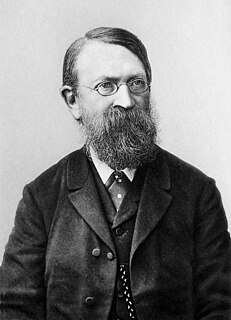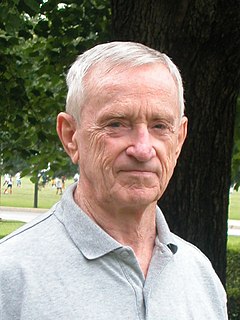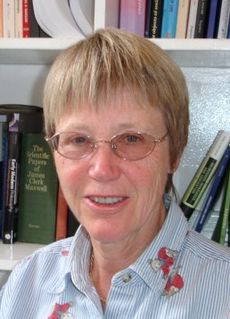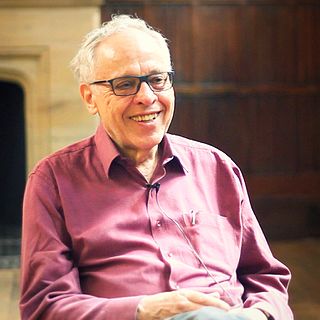
John William Strutt, 3rd Baron Rayleigh,, was a British scientist who made extensive contributions to both theoretical and experimental physics. He spent all of his academic career at the University of Cambridge. Among many honours, he received the 1904 Nobel Prize in Physics "for his investigations of the densities of the most important gases and for his discovery of argon in connection with these studies." He served as President of the Royal Society from 1905 to 1908 and as Chancellor of the University of Cambridge from 1908 to 1919.

Science is a systematic enterprise that builds and organizes knowledge in the form of testable explanations and predictions about the universe.

Ernst Waldfried Josef Wenzel Mach was an Austrian physicist and philosopher, noted for his contributions to physics such as the study of shock waves. The ratio of one's speed to that of sound is named the Mach number in his honour. As a philosopher of science, he was a major influence on logical positivism and American pragmatism. Through his criticism of Newton's theories of space and time, he foreshadowed Einstein's theory of relativity.

Ira Remsen was a chemist who, along with Constantin Fahlberg, discovered the artificial sweetener saccharin. He was the second president of Johns Hopkins University.

John David Barrow is an English cosmologist, theoretical physicist, and mathematician. Most recently, he served as Gresham Professor of Geometry at Gresham College from 2008 to 2011. Barrow is also a writer of popular science and an amateur playwright.

Robert Lee Park is an American emeritus professor of physics at the University of Maryland, College Park, and a former director of public information at the Washington office of the American Physical Society. Park is most noted for his critical commentaries on alternative medicine and pseudoscience, as well as his criticism of how legitimate science is distorted or ignored by the media, some scientists, and public policy advocates as expressed in his book Voodoo Science. He is also noted for his preference for robotic over manned space exploration.
Peter Achinstein is an American philosopher of science at Johns Hopkins University.

Nancy Cartwright, Lady Hampshire, is an American philosopher of science. She is a professor of philosophy at the University of California at San Diego and the University of Durham. Currently, she is the President of the Division for Logic, Methodology and Philosophy of Science and Technology of the International Union of History and Philosophy of Science and Technology.

Joseph Ivor Silk FRS is a British astrophysicist. He was the Savilian Chair of Astronomy at the University of Oxford from 1999 to September 2011.

Adam Guy Riess is an American astrophysicist and Bloomberg Distinguished Professor at Johns Hopkins University and the Space Telescope Science Institute and is known for his research in using supernovae as cosmological probes. Riess shared both the 2006 Shaw Prize in Astronomy and the 2011 Nobel Prize in Physics with Saul Perlmutter and Brian P. Schmidt for providing evidence that the expansion of the universe is accelerating.
David B. Malament is an American philosopher of science, specializing in the philosophy of physics.
David C. Lindberg was an American historian of science. His main focus was in the history of medieval and early modern science, especially physical science and the relationship between religion and science. Lindberg was the author or editor of many books and received numerous grants and awards. He also served as president of the History of Science Society and in 1999 was recipient of its Sarton medal.

Philosophy is the study of general and fundamental questions about existence, knowledge, values, reason, mind, and language. Such questions are often posed as problems to be studied or resolved. The term was probably coined by Pythagoras. Philosophical methods include questioning, critical discussion, rational argument, and systematic presentation. Classic philosophical questions include: Is it possible to know anything and to prove it? What is most real? Philosophers also pose more practical and concrete questions such as: Is there a best way to live? Is it better to be just or unjust? Do humans have free will?
Craig Callender is a philosopher of science and professor of philosophy at the University of California, San Diego.
Jeffrey Bub is a physicist and philosopher of physics, and Distinguished Professor in the Department of Philosophy, the Joint Center for Quantum Information and Computer Science, and the Institute for Physical Science and Technology at the University of Maryland, College Park.

Robert G. Sachs was an American theoretical physicist, a founder and a director of the Argonne National Laboratory. Sachs was also notable for his work in theoretical nuclear physics, terminal ballistics, and nuclear power reactors. Sachs was also a member of the National Academy of Sciences, chairman of the Academy's Physics Section, chairman of the Academy's Class I, and director of the Enrico Fermi Institute of the University of Chicago. Sachs was the author of the standard textbook Nuclear Theory (1953).

Dr. Robert Fox MA, DPhil, FRHistS is a leading British authority on the history of science. He is interested in the history of sciences and technology in Europe from the 18th century onwards. He has published extensively. His book The Savant and the State examines science, culture and politics in France between 1814 and 1914, while Science without Frontiers examines developments from the late nineteenth-century until the Second World War. In 2015, Fox received the George Sarton Medal, the premier award of the international History of Science Society (HSS). He was recognized as a Chevalier of the Ordre des Arts et des Lettres by France's Ministry of Culture in 2006.
Russell Keith McCormmach, the husband of the late Christa Jungnickel, is an American historian of physics.
Stephen George Brush is a scholar in the field of history of science whose career spanned the late twentieth and early twenty-first century. His research resulted in hundreds of journal articles and over a dozen books.











